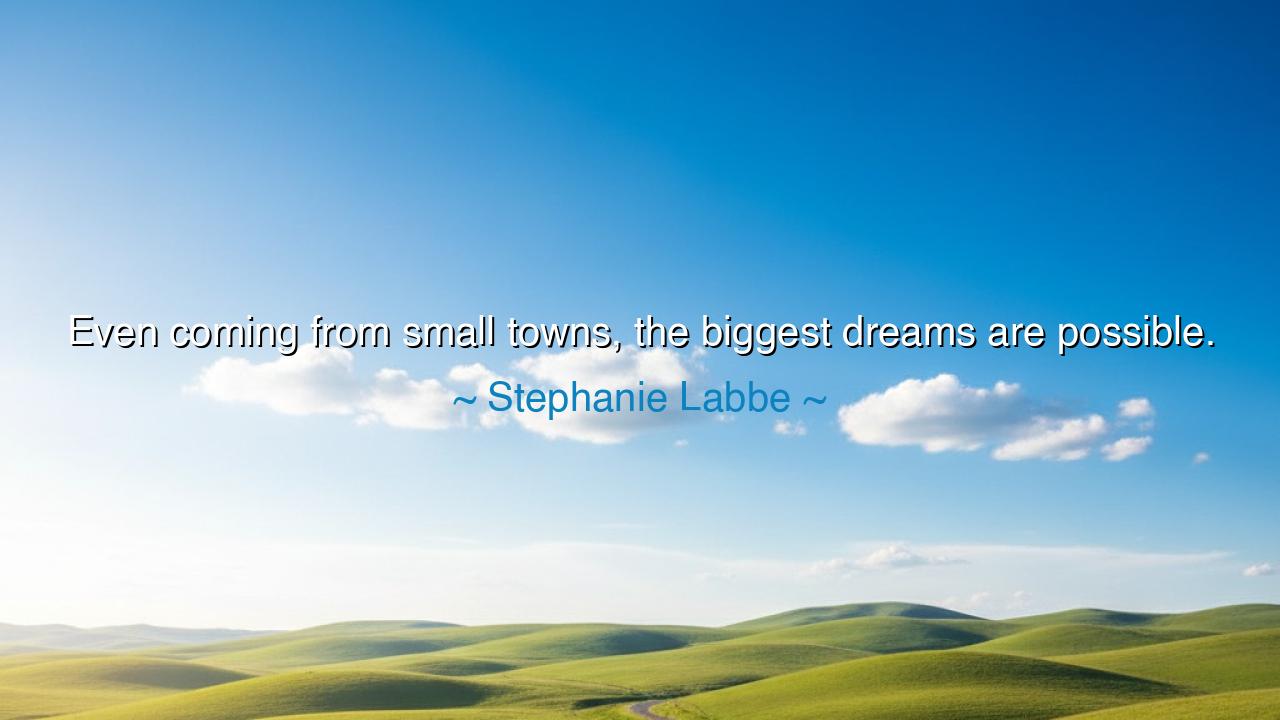
Even coming from small towns, the biggest dreams are possible.






The great athlete and champion of perseverance, Stephanie Labbé, once said: “Even coming from small towns, the biggest dreams are possible.” Though her words may appear simple, they resound like the clear call of a trumpet across generations — a song of faith, courage, and endurance. In them lies a truth as old as humanity itself: that greatness is not born of circumstance, but of spirit. The soil of one’s birth does not determine the height of one’s destiny. Even from the humblest of places — the quiet village, the forgotten valley, the narrow road — a soul aflame with purpose can rise to touch the stars.
Labbé’s words arise from her own life’s journey — a tale of a young woman from Stony Plain, a small town in Alberta, who dared to dream beyond the limits of geography and expectation. She grew not in the shadow of grand arenas, but beneath the open skies of rural fields. Yet within her heart lived a vision greater than her surroundings — the vision of becoming one of the finest goalkeepers in the world, of representing her nation upon the global stage. Through struggle, injury, doubt, and rejection, she endured — until she stood triumphant with Olympic gold for Canada. Her story is proof that greatness can spring from the most unlikely soil, that small beginnings do not confine great destinies.
Throughout the ages, the same truth has revealed itself in every field of human endeavor. Consider Abraham Lincoln, born in a one-room log cabin in the wild frontier of Kentucky. He had little education, no wealth, no inheritance — only a hunger to learn and a heart resolute in purpose. From such modest origins, he rose to become the savior of a divided nation, the champion of liberty, the voice that proclaimed freedom to millions. Or consider Marie Curie, born in a poor Polish town under oppression, who dreamed of uncovering the secrets of the atom — a dream so vast that few could even imagine it. Yet she, too, broke through the confines of her world, discovering radium and polonium, and winning not one, but two Nobel Prizes. These, like Labbé, are witnesses to an eternal law: that the size of the dream is never limited by the size of the town, but by the courage of the dreamer.
When Stephanie Labbé speaks of “the biggest dreams,” she speaks of those ambitions that stretch the soul — the dreams that demand sacrifice, patience, and faith. The small town is a metaphor for the narrowness of circumstance — the walls built by fear, by doubt, by the voices of those who say, “You cannot.” Every person, at some point in life, begins in a “small town” of the spirit — a place where possibilities seem few and horizons short. Yet the dreamer, like the traveler in the wilderness, must lift their eyes to the mountains beyond, believing that what lies unseen can one day be reached. For the dream is not a luxury — it is the seed of transformation.
To dream greatly from a small beginning requires not arrogance, but faith — faith in the unseen potential within oneself, faith that the journey will shape what is lacking. It is not the privilege of the powerful, but the inheritance of the brave. As the ancients taught, “He who plants a seed beneath the soil believes in a world he may never see.” So too must the dreamer from the small town believe that their labor, unseen and uncelebrated, will one day blossom into glory. The winds may whisper discouragement, but those who persist find that the limits of their birthplace are not walls — they are thresholds.
Yet let none mistake Labbé’s message for one of mere ambition. It is not simply a call to success, but a call to self-belief and perseverance. To the youth in quiet places, to those who feel unseen or unheard, her words carry a sacred promise: that your origin is not your destiny. The fields of greatness are not reserved for the mighty, but for the faithful — those who dare to rise early, to toil, to believe when no one else believes. Every practice, every failure, every moment of resilience becomes a brick in the road that leads from obscurity to triumph. The world honors the victory, but the gods honor the perseverance.
So let this be the teaching that passes to future generations: Do not curse the smallness of your beginnings. Rejoice in them, for they are the proving grounds of greatness. If you are born in a small town, let it teach you humility, endurance, and hunger — the very virtues that cities often forget. Let your dreams be vast, your will unyielding, your faith unshakable. For Stephanie Labbé’s truth is the truth of every hero, every artist, every soul who has ever risen beyond their station: that destiny is not decided by where you start, but by how far you dare to go.
And when your time comes, when you stand upon the mountaintop of your own endeavor, remember to look back to the small town that bore you — not in pride, but in gratitude. For the soil that once seemed too narrow was, in truth, the foundation that gave your roots strength. The world may call it humble; you shall call it sacred. For it is from the smallest places that the greatest dreams grow.






AAdministratorAdministrator
Welcome, honored guests. Please leave a comment, we will respond soon